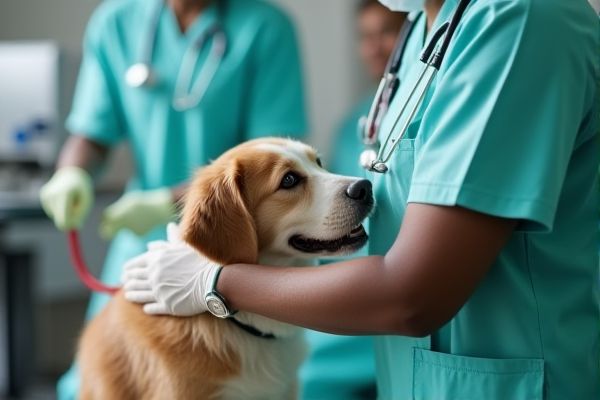
The demand for veterinary professionals in Nigeria is growing due to an increase in livestock farming and pet ownership. Opportunities are available in various sectors, including private veterinary practices, government agencies, and research institutions. New graduates can explore roles in animal healthcare, public health, and food safety, while experienced veterinarians may find positions in academic teaching or specialized clinics. Networking within the veterinary community and participating in relevant workshops can enhance career prospects and open new avenues for professional growth.
Job Description
A veterinary job in Nigeria involves diagnosing and treating illnesses in various animals, from pets to livestock. Responsibilities include conducting health assessments, administering vaccinations, and providing emergency care. Effective communication with pet owners and farmers is essential to educate them on proper animal care and preventive measures. Your role may also encompass collaborating with public health initiatives to manage zoonotic diseases and ensure food safety from animal sources.
Requirement
In Nigeria, pursuing a veterinary career requires a Bachelor of Veterinary Medicine (BVetMed) degree from an accredited institution. Candidates must also possess practical experience through internships or attachments at veterinary clinics or farms. Registration with the Veterinary Council of Nigeria is essential to practice professionally, ensuring adherence to ethical standards. Continuous professional development is encouraged to keep current with advancements in veterinary medicine and animal care.
Salary and Perks Expected
In Nigeria, the salary for veterinary professionals varies based on experience and location, typically ranging from N100,000 to N300,000 monthly. Entry-level positions often start at the lower end, while experienced veterinarians in urban areas may command higher wages due to demand and cost of living. Your career advancement can also lead to specialized roles, such as veterinary surgery or research, which may offer even greater financial rewards and benefits. Many veterinary jobs provide perks like flexible hours, opportunities for continuing education, and the satisfaction of caring for animals and improving community health.
Similar Job Names
- Veterinarian
- Veterinary Technician
- Veterinary Nurse
- Animal Health Officer
- Veterinary Pathologist
- Veterinary Surgeon
- Animal Nutritionist
- Wildlife Veterinarian
- Veterinary Microbiologist
- Veterinary Pharmacologist
- Veterinary Epidemiologist
- Veterinary Research Scientist
- Animal Behaviorist
- Clinical Veterinarian
- Pet Groomer
- Animal Welfare Officer
- Veterinary Radiologist
- Veterinary Toxicologist
- Zoonotic Disease Specialist
- Veterinary Practice Manager
Job Expectation Concept
Veterinarians in Nigeria play a crucial role in promoting animal health, providing services that ensure livestock and pets are well-cared for. Your responsibilities may include diagnosing illnesses, administering vaccinations, and offering guidance on nutrition and breeding practices. The increasing demand for veterinary services in rural and urban areas highlights the importance of this profession in sustaining agricultural productivity and public health. Continuous professional development and engagement with communities are essential for addressing the evolving challenges in animal healthcare.
Career Advantage and Weakness
A veterinary career in Nigeria offers numerous advantages, including the growing demand for animal healthcare due to rising pet ownership and livestock farming. Your skills can lead to diverse opportunities in clinical practice, research, and public health, enhancing professional growth. Challenges include limited resources, lack of advanced veterinary facilities, and low salaries compared to other medical professions, which can deter potential candidates. Continuous education and specialization can help mitigate these weaknesses, allowing veterinarians to thrive in a competitive landscape.
Important Thing Must Know
Veterinary jobs in Nigeria play a crucial role in maintaining animal health and protecting public health through disease prevention. A veterinarian's responsibilities often include diagnosing illnesses, providing vaccinations, and performing surgeries on various animals, both domesticated and wild. Continuous education and training are vital due to the evolving nature of veterinary medicine, ensuring you remain updated on the latest practices and treatments. The demand for veterinary services is increasing, driven by the growing livestock industry and the rising popularity of pet ownership among Nigerians. Networking and building relationships within the agricultural and veterinary communities can enhance career opportunities and foster professional growth.
Alternative Career Options
Exploring alternative career options in Nigeria for veterinary professionals can open doors to various rewarding paths. Positions in wildlife conservation allow you to work in protecting endangered species and habitats while contributing to biodiversity preservation. In the agricultural sector, you can focus on livestock management, ensuring animal health and production efficiency, which is crucial for the country's economy. Additionally, roles in public health and disease control enable you to address zoonotic diseases, enhancing community well-being.
Companies List
- Veterinary Clinics and Hospitals
- Animal Shelters and Rescue Organizations
- Zoos and Wildlife Conservation Centers
- Agricultural and Farm Services
- Pharmaceutical Companies for Animal Health
- Research Institutions and Laboratories
- Government Veterinary Services
- Pet Supply Retailers
- Food Processing Companies
- Veterinary Consultancy Firms
List of Ideal City
Lagos, Nigeria's largest city, offers numerous opportunities in veterinary medicine due to its bustling population and diverse animal needs. Abuja, the capital, provides a more structured environment with government and private sectors investing in veterinary services. Ibadan, known for its agricultural undertakings, presents a growing demand for veterinary professionals, particularly in livestock care. Port Harcourt, with its industrial backdrop, also seeks qualified veterinarians to manage both pets and larger animals in urban settings.
 jobs-nigeria.com
jobs-nigeria.com